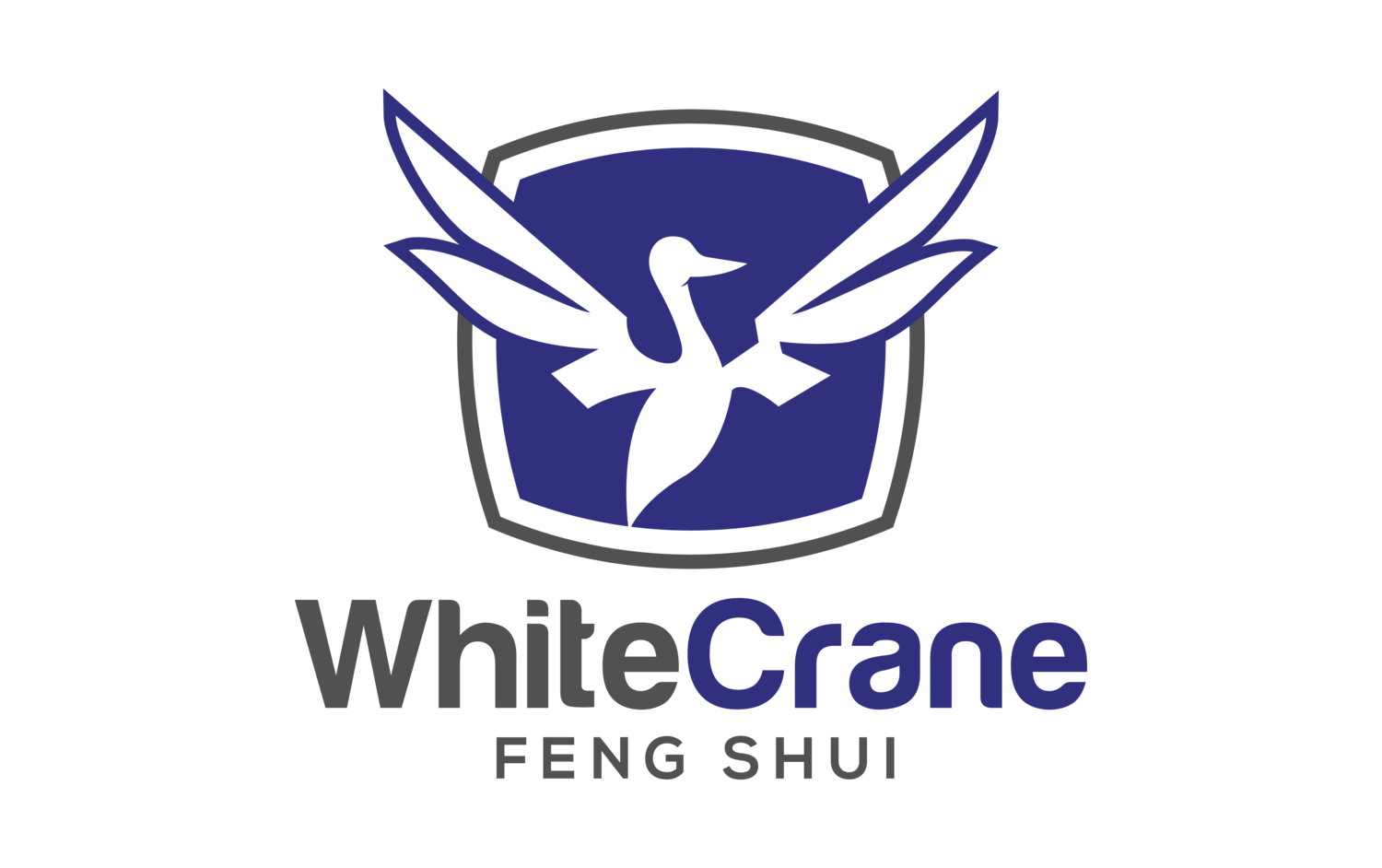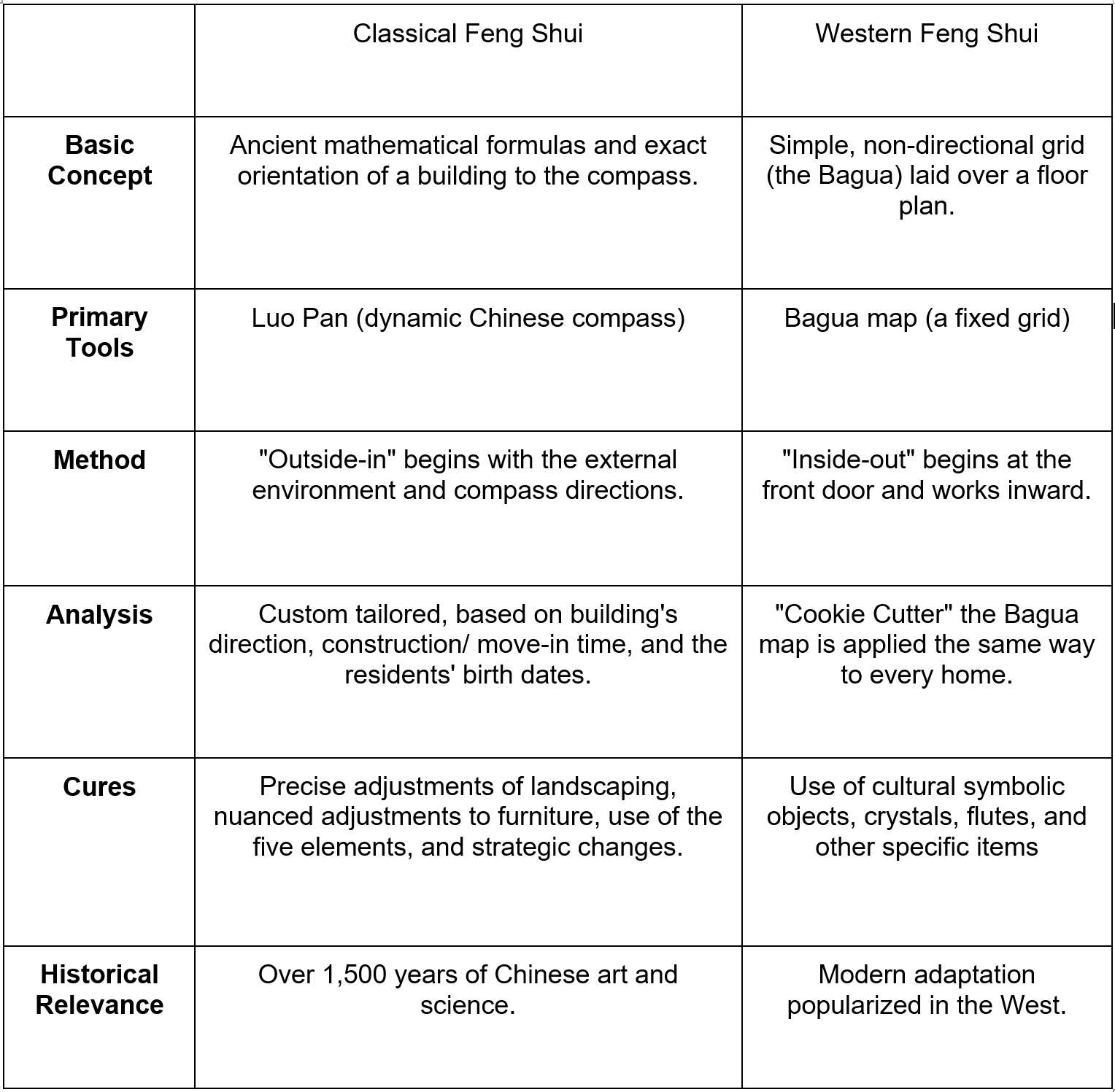Frequently Asked Questions About Feng Shui
Table of Contents
-
1. What is Feng Shui?
Feng Shui (pronounced "fung shway") is the ancient Chinese art and science that literally translates to "wind" and "water." It is a practice of arranging and harmonizing with your environment to promote balance, health, and prosperity. It is the belief that our surroundings have a profound effect on our lives and that by consciously aligning our spaces with the flow of natural energy, or "Chi" (or "Qi"), we can improve our well-being.
-
Chi is the energy that flows through all things and space. In Feng Shui, the goal is to create an environment where Chi can flow smoothly and beneficially. Stagnant or blocked Chi can lead to feelings of lethargy and disease, while overly fast or chaotic Chi can create stress and anxiety. Feng Shui aims to create a gentle, balanced flow of Chi.
-
The practice of Feng Shui is based on several key principles:
The Five Elements: Wood, Fire, Earth, Metal, and Water. Each element represents different qualities and energies, and they interact in a cyclical and destructive relationship. Feng Shui uses these elements to balance a space. For example, adding a plant (Wood) to a room with a lot of metal can create balance.
Yin and Yang: This is the concept of two opposing, yet complementary, forces. Yin represents feminine, passive, dark, and cool energies, while Yang represents masculine, active, light, and warm energies. A balanced space has a mix of both.
The Bagua: The Bagua is a tool or map used in Feng Shui to analyze a space. It divides a home or business into eight directions. Using a feng shui compass determines which areas of your location and space you can apply specific formulas and cures to improve your life.
-
Yes, Feng Shui principles can be applied to any space, from a single room to an entire home, office, or garden. However, Feng Shui is holistic. For best results, it must be applied to the whole property. Additionally, applying it to only one room will not produce the full effect.
-
Certainly not. Feng Shui is not about overhauling your entire decor. It's about making specific, calculated, intentional changes. Sometimes, simply de-cluttering, getting organized, moving a piece of furniture, or adding a specific element can have a significant effect. Start with the most important things like your bed or desk and gradually incorporate the other changes.
-
Clear the Entrances: Doors are the mouths of Chi. Keep the entrances clear, clean, and welcoming.
De-clutter: This is the most fundamental principle. Clutter blocks the flow of Chi and can create feelings of being overwhelmed. Start by clearing out a single room or even a drawer.
Natural Light: Allow as much natural light in as possible. This brings positive energy and vitality.
Regular Routine Maintenance and Repair: It will save you more money and is cheaper than replacing roofs, walls, foundations, plumbing, appliances and/or furniture.
-
Feng Shui is neither a religion nor a superstition. It is an art and a science based on thousands of years of observation of how environments affect human well-being. While it can be seen as spiritual in a sense, it does not require a belief in a specific deity or religious doctrine. Many people see it as a form of mindfulness, a way to be more intentional about their living space.
-
Feng Shui is a tool, not a magic cure-all. It can create an environment that supports your goals and aspirations, but it requires you to take action and make positive choices in your life. It can help you feel more focused, productive and healthy, but it won't do the work for you. It's a way to set the stage for success, not a guarantee of it.
-
The biggest misconceptions are that Feng Shui is all about placing specific "lucky charms" or certain types of Asian cultural items in your home or office. While these can be part of your religion or philosophy, the real power of Feng Shui lies in the principles of energy flow, balance, and harmony. It's more about location and environment than about buying objects.
-
The main difference between Classical Feng Shui and Western (or modern) Feng Shui lies in their complexity, methodology, and focus. While both share the same fundamental goal of harmonizing a space for better well-being, they approach it in very different ways.
Here's a breakdown of the key distinctions:
Classical Feng Shui is the original, traditional practice that originated in ancient China and has been refined over thousands of years. It is considered a complex and scientific art based on rigorous calculations and an in-depth analysis of a site's energy.
Reliance on a Compass: This is perhaps the most significant difference. Classical Feng Shui is an "outward-in" practice that relies on precise compass readings using a specialized tool called a Luo Pan. The direction a building faces is crucial as it determines how energies influences the space.
Emphasis on the Environment: Classical Feng Shui places great importance on the external environment, also known as "Form School." Practitioners analyze landforms like mountains, rivers, and the surrounding structures (roads, buildings) to understand the flow of energy (Chi) before ever stepping inside the home.
Time and Calculations: It incorporates the element of time. The energy of a structure is not static; it changes over time based on specific cycles. Classical feng shui uses complex mathematical formulas, such as the Flying Star system, to create an energy map of a home that accounts for both its construction date and the current time period.
Personalized Analysis: The analysis is highly personalized to the inhabitants of the space. A classical practitioner will often use a person's birth date (using Chinese astrology and Eight Mansions) to determine their unique energy and how it interacts with the energy of the home.
Cures and Enhancements: Cures are often subtle and pragmatic. They might involve rearranging furniture, adding or removing a specific element (like a plant or a water feature), or changing the function of a room. They don't rely on the placement of symbolic, "good luck" objects. The focus is on re-orienting a space to tap into beneficial energy, not simply adding a trinket to a corner.
Western Feng Shui, often referred to as "Black Hat Tantric Buddhist" (BTB) Feng Shui, is a modern and simplified adaptation that gained popularity in the West in the 1980s. It was developed to make the practice more accessible and less complex for a Western audience.
No Compass Required: Western Feng Shui is a non-directional system. It does not use a compass to determine a building's orientation. Instead, it uses a simplified version of the Bagua map that is always oriented to the front door, regardless of which direction it faces. This is sometimes called the "Three Gate System" because the front door is always placed in one of the three bottom areas of the Bagua.
Focus on the Interior: It is an "inside-out" practice that focuses primarily on the interior of a space. While some principles of form are considered (e.g., clutter), it largely disregards the external landscape and directional influences that are so critical in classical practice.
The "One-Size-Fits-All" Bagua: The simplified Bagua map is the central tool. It is a grid that is laid over any floor plan, with each section (or "gua") corresponding to a different life area (e.g., Wealth, Love, Career). The "wealth corner" is always the same location (back-left corner) relative to the front door, for every home.
Symbolic Cures: Western Feng Shui is well-known for its use of symbolic "cures" and objects, such as a three-legged frog, a water fountain, or a specific-colored crystal. The belief is that placing these objects in the corresponding Bagua section will activate the desired life area. This has led to the commercialization of Feng Shui accessories.
Focus on Intent: There is a greater emphasis on personal intention and psychological effects. The idea is that placing a "love charm" in your "love corner" will keep the idea of love at the forefront of your mind and help you attract it.
Western Feng Shui is a great starting point, as it's easy to understand and implement. However, it is over-simplified and often incorrect. Classical Feng Shui is more complex and powerful, as it addresses the intricate flow of energy on a deeper, more precise level.
-
Hiring a feng shui professional can be a beneficial step for creating a more harmonious and supportive environment. While some people can apply basic feng shui principles on their own, a professional offers a tailored and holistic approach that goes beyond simple decorating and interior design.
Here are some key situations when hiring a feng shui professional may be a good idea:
• Moving to a New Space
Is an ideal time to work with a feng shui consultant. It can help you assess a potential property before you buy or rent it, and then help you set up your new home or office from the very beginning to ensure a strong foundation for positive energy flow.
• Experiencing Challenges or Feeling Stagnant
If you feel stuck in a rut, consistently stressed, or like things are not going well in certain areas of your life (e.g., health, relationships, career, or finances). Hiring a feng shui expert provides a fresh, objective perspective, to help identify imbalances in your space that may be contributing to these issues and offer solutions to correct them.
• Turning a New Leaf or Setting New Goals
A feng shui consultation can be a powerful tool when you are embarking on a new phase of life, such as starting a new career, seeking a new relationship, or focusing on personal growth. A professional can help you arrange your space to support and amplify your specific aspirations.
• Renovation, Major Repairs or Interior Design Projects
If you are planning a renovation, doing major repairs or are simply redecorating, a feng shui consultant can work alongside your interior designer to make sure the new layout not only looks good but also has a positive energetic flow. They can provide guidance on furniture placement, color choices, and the use of natural elements to create a more supportive and balanced environment.
• When DIY Isn't Working & you want it to be Accurate, Quick and Easy
Books and online resources can provide a lot of information about feng shui, but it's a complex discipline that can be difficult to apply effectively on your own. A professional can analyze your unique situation, including your birth date and the specific layout of your home, to provide a customized plan that you can't get from a generic guide.
-
• Holistic Assessment: your location, environment, taking into account the orientation of your building, your space, the layout of the rooms, and your personal goals.
• Personalized Recommendations: a tailored plan that may include organizing,de-cluttering advice, furniture rearrangement, and suggestions for specific colors, objects, or symbols to enhance energy flow.
Guidance and Support: coaching to help you implement the recommendations and other follow-up services.

Your Home is a Living Space not a storage space
- Francine Jay

